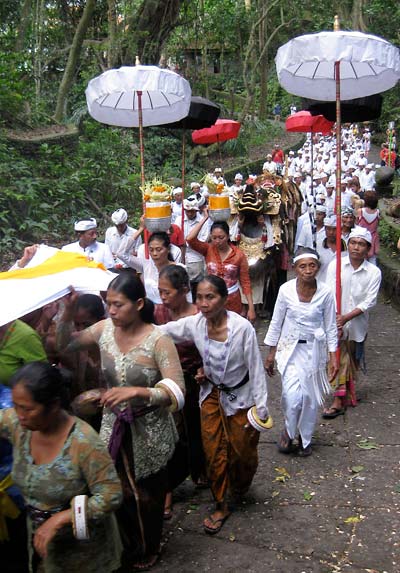The aromas of Bali and the contours of a furious debate
Human-rights fellow Rochelle Terman writes from a conference in Bali — where activists, mostly from Asia, tussle with how to engage the public in a conversation about culturally-justified violence against women.
August 16, 2010
Bali, Indonesia — The first thing you notice when you visit Bali is that how wonderful it smells. Incense is burned constantly and women dab themselves with rose oil. In the streets, roasting duck gives off scrumptious aromas — making me think of those squiggly lines emanating from cartoon versions of turkey dinners. For a tropical island so close to the equator, with all the sweatiness that entails, this place is a feast for the nostrils.
 Each year the UC Berkeley-based Human Rights Center awards summer fellowships to students from University of California campuses, to enable them to work with human-rights organizations in the U.S. and abroad. Three current Human Rights Fellows have agreed to share their experiences this summer, with regular updates from the field to be published on the NewsCenter. Rochelle Terman sends her first post from Montreal.
Each year the UC Berkeley-based Human Rights Center awards summer fellowships to students from University of California campuses, to enable them to work with human-rights organizations in the U.S. and abroad. Three current Human Rights Fellows have agreed to share their experiences this summer, with regular updates from the field to be published on the NewsCenter. Rochelle Terman sends her first post from Montreal.
 Rochelle Terman
Rochelle Terman
on women living under Muslim laws
- Defending the rights of Muslim women is a highly charged minefield
- Violence against women in the name of ‘culture’ is pandemic
- How activism has brought me closer to my ‘Madar’ and my heritage
- A cousin’s bat mitzvah, and the tradition of defending our traditions by any means necessary
- A one-way path towards gender justice: The West leading the rest
- The aromas of Bali and the contours of a furious debate
- Reflections on a hijab-wearing Iranian feminist and how she touched my life
The second thing I notice about Bali is that what fancy clothes its gods wear. Bali is the last major Hindu hold-out in a primarily Muslim Indonesia, and stone statues of Vishnu (and his various embodiments) populate most of its street corners. These gods, dressed in black and white checkered sarongs, watch over the city — often with a flower in their hair, often covered in sweet-smelling offerings: flower petals, sandalwood, or grains of rice. Sometimes even the trees are draped in beautiful sarongs, making my tattered shorts look very unholy.
I arrived in Bali after nearly 36 hours of travel by car, train, airplane, and taxi, with layovers in Manila and Singapore. By the time I arrived, the only things I had energy to notice were the nice smells and well-dressed deities. But after a good night’s rest, I awoke the next morning energized and prepared for what I hoped would be an exciting and fulfilling week.
I’m in Bali for a five-day training and planning session on using online tools to campaign around culturally-justified violence against women (CVAW). A dozen other participants from Asian nations are in attendance, representing SKSW Campaign [for Stop Killing and Stoning Women] organizational partners in Afghanistan, Pakistan, Indonesia (including Aceh and Jakarta), and Malaysia. We’re all here to expand our information- and communication-technology toolkit in order to advance campaigns around CVAW in our own local contexts.
As a representative for the SKSW Campaign international team, my role is not only to learn these tools, but to think about how to enhance the SKSW’s overall communication strategy — in order to better integrate our local partners into the Campaign’s international structure.
What’s feminism got to do with it?
But first things first: feminism. In my last post I promised to discuss further the accusation that feminism operates as a form of cultural imperialism. Why is this issue so important? I got a reminder, recently, from reader responses to TIME magazine’s disturbing front cover image of an Afghan girl who had suffered unthinkable abuse. The photo was accompanied by the headline: “What Happens If We Leave Afghanistan?”
For responses to the cover, see:
I used my time in Indonesia to casually ask participants if they considered themselves “feminist,” and why. Everyone I asked responded in the affirmative, though many added that feminism has a bad reputation in their country. Kamila, the founder of a LBGTQ rights organization in Indonesia, told me what feminism meant to her: “Feminism is not just about activism. It’s about a way of life. We want to introduce feminism to young women. In the Indonesian context, people think feminism is only about NGOs, activism; some people even think that feminism is only for lesbians. But we want to show that even young women can be feminist, and in fact they already are feminist, in the way they live their lives.” (She quickly added: “And so what if you’re lesbian?”)
Kamila is currently working on a project that introduces feminism to young women in Jakarta using something called “edu-fun-tainment.” Since feminism can have a serious connotation that can scare people away, she hopes to use fun activities and social gatherings for young, urban women to raise awareness about women’s rights and women’s sexuality.
‘A Western agenda’ and the risk of backlash
Unfortunately, feminism isn’t always presented in such a light-hearted way. Many participants talked about the risks associated with their feminist activism. Hina, a community organizer working on domestic violence in Pakistan, says: “Some people say ‘you are working for a Western agenda, you are lying about Islam. You are trying to destroy our religious and social tradition, and create problems for women.’ Sometimes we are threatened and harassed.”

A religious ceremony at the Monkey forest in Ubud, Bali. (Rochelle Terman photo)
Hina touches on a very serious issue that was raised several times during the training — the accusation of “Islamophobia.”
Consider, for instance, the case of Aceh, Indonesia, where Shari’a (Islamic Law) is the law of the land. In 2009, the Aceh Legislative Council (DPRD) passed an expansion of the “Qanun Jinayah” (Islamic Criminal Code) that would impose cruel punishments such as caning for the “crimes” of adultery and homosexuality. Local allies in Aceh have since been advocating for the law’s repeal, but do not demand the complete abolishment of Shari’a. Such a demand would not only be ineffective, they said, but would lead to backlash by Islamist groups, who would claim that the activists are “attacking Islam.”
Workshop participants noted that campaigns for Muslim women’s rights are often hijacked by conservative groups in the West who depict Islam as inherently backwards, cruel, and undemocratic — as in recent debates over niqab bans and building of mosques. I heard repeatedly during the training that anti-Muslim prejudice actually hurts women’s rights and the activists who defend them.
The activist from Aceh told me that, for her, Shari’a per se is not the problem, as Shari’a can take many forms and have many interpretations. What is bad for women, she argued, are conservative interpretations of Islamic law. So she was working with imams and religious scholars in her country — with great success — to raise awareness on violence and women’s rights.
Hina, too, told me that she responds to accusations of “serving a Western agenda” by talking about Islam and Pakistani culture, citing “words of our Prophet,” in the process, so that people “see we are not against Islam or our culture.”
When Western commentators call feminism “inauthentic to Third World cultures,” how does it impact women like Hina, who is trying to establish that gender equality is, indeed, indigenous to her community?
Reclaiming feminism
Feminism is often used as a straw man standing in for “Westernization” or neo-conservatism. As Vivienne Wee, another workshop participant, pointed out: “Nobody stops using the bicycle because it wasn’t invented in Asia.” In fact, Muslim societies often have no problem appropriating Western-style educational systems, bureaucratic structures, technology, or institutions. But when it comes to women’s rights, the need to be “authentic” is invoked.
For that matter, what is “authentic” anyway? Edna Aquino, another veteran campaigner, took issue with Vivienne’s bicycle analogy. “Feminism isn’t like the bicycle. It wasn’t invented in the West,” she said. “Women have been fighting for their rights in non-Western contexts for generations.” So why do many people see feminism as “inauthentic” to Asian or Muslim cultures?
The authority and ability to speak for a culture, religion, or tradition is often the product of privilege and political agendas. So we should exercise skepticism, I think, when someone makes a blanket statement about “Indonesian culture,” “Pakistani tradition,” or “Mulsim law.” As Kamila notes: “An Indonesian governor said that there were no gay people here because Indonesia is a Muslim country. He is saying this for political reasons. I want to say ‘No, the West did not bring homosexuality to Indonesia.’ But I cannot write in English, and neither can many of my friends. So people in the West do not hear us.”
Kamila’s comment points to a major problem — the fact that English is hegemonic in international discussions of these issues. As a result, most of the activists deemed to be “representing'” developing nations are actually located in Western countries. Often, these “experts” are reacting to Western domestic politics, not genuinely reflecting the tone of the conversation “on the ground” in the non-West.
When I mentioned to Kamila the recent controversy over perceived racism and “Orientalism” in “Sex and the City 2,” Kamila responded that she liked the movie and related to it despite being feminist, Muslim, and Indonesian. But because of the linguistic divide, she couldn’t participate in the debate.
In the end, I realized that although our workshop group differed by nationality, religion, race and class, we were all women’s human-rights defenders. And that meant striving for gender equality regardless of cultural context or location.
Okay — neo-conservatives hijack the demand for women’s rights to serve their own imperialist agenda. Instead of eschewing feminism, though, we should refuse to acknowledge these pundits as “feminist” regardless of how they describe themselves. After all, Rand Paul and Glenn Beck both claim they abhor racism. But we don’t need to reject the label “anti-racist” in order to disassociate ourselves from these guys.
Yes, feminism has a mixed history. But why throw out altogether a broad and heterogeneous discourse such as feminism simply because of past political and theoretical blunders made in its name? Many progressive ideologies come with ugly baggage, yet we aren’t asked to dismiss them altogether. Anti-imperial movements in the developing world, for instance, have often been stained by racisim and classism, not to mention sexism. But why condemn anti-imperialism altogether because of those unfortunate missteps?
I’m going to keep describing myself as “feminist” and supporting colleagues in developing countries who describe themselves that way. The West doesn’t have a monopoly on gender activism. As Vivienne put it: “Nobody says patriarchy was invented in the West — so why do we say feminism was invented in the West?”
About Rochelle Terman

The daughter of a Muslim-Iranian mother and Jewish-American father, Rochelle Terman became interested in women’s rights in Iran while an undergraduate at the University of Chicago studying political science and Near Eastern studies. During that time, Terman did a summer internship at Women Living Under Muslim Laws — an international solidarity network for women whose lives are shaped by laws and customs said to derive from Islam — and helped to found the Global Campaign to Stop Killing and Stoning Women (SKSW).
Now a graduate student at Berkeley focusing on political science, Terman, 24, will spend the summer researching and documenting success stories of local women’s organizations located in seven countries — Afghanistan, Indonesia, Iran, Nigeria, Pakistan, Senegal and Sudan — as part of her continued work with SKSW.

